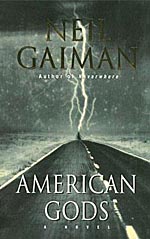
![]() BigEnk
BigEnk
11/28/2024
![]()
I don't find myself nearly as enamored with American Gods as the consensus opinion is. There are moments of brilliance that are anchored by lengthy stretches of unremarkable and nonexistent plot and flat prose. The premise itself is something worth writing about, but it's a shame to see it squandered to this degree. In American Gods, Gods are real tangible lifeforms that feed off of prayer, sacrifices, and human thought. America is littered with Gods from the old world that were brought over in the minds of the immigrants and slaves that came across the ocean. These gods have fallen out of favor over the generations, finding themselves playing second fiddle to the gods of TV, internet, and consumerism, newer gods that represent the change of values. At the heart of the story is Shadow, a recently released convict who has no place to come home to, since his partner died in a car crash just before his release. He finds himself working for the mysterious and threatening Mr. Wednesday, traveling the middle of the US recruiting old gods to fight in a coming battle between the old and new.
Where Gaiman really shines is in the dreamlike exploration of the gods in their many forms. The first time that Shadow sees them in all of their forms simultaneously on the carousel is a memorable and effective moment. The prose fit the mood of the scene really well, and I found myself drawn into the space. American Gods also has strong opening and closing acts. The plot is tied together well in the end with clear thematic ideals.
Gaiman clearly has a lot of love for the Midwestern US, which is where I think he lived (still lives?) for a lenghty period of time. The middle of the book, where in my opinion it drags the most, is where he expounds on the virtues of Midwestern life, using it as a placeholder for all American culture. I just don't think that his prose is strong enough to carry through a section that from a plot perspective is super mundane. Sure, this section sets up a lot of stuff at the end of the novel, but that's not enough to justify how boring it is most of the time. I find his prose lacking flavor and texture most of the time. It's too literal for a story about mysticism, so lacking of any adornment that I found my attention sagging frequently.
Gaiman also sees a hollowness under the surface of American culture, which is where I think his biggest argument is. In his mind America is devoid of a spirituality that would knit the people together. Instead of having reverence for the old gods or the land itself, they fill in with consumerist and corporate replacements that are a shell of the gods with cultural value.
I just couldn't help but find myself bored a lot of the time. It's an interesting if not exactly unique premise, I just wish that more had been done with it. There's a lot of lenghty driving scenes, scenes where shadow idly does coin tricks, and general fluff. I also find some of the structure to have repeated itself a bit too much. Shadow goes into dreams almost habitually, making for a predictable cadence to the plot. Just a lot of wasted potential here that I wish I connected with more. My rating has a lot to do with the strength of the ending, which surprised me at times.